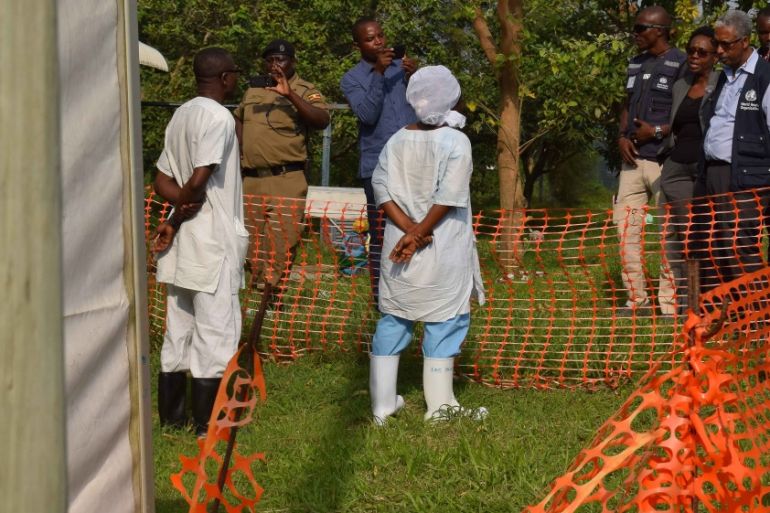Uganda’s burgeoning refugee burden
The country already hosts more than one million refugees as more people escaping violence in the DRC arrive.

Kampala, Uganda – In July last year, Maska Wizine’s brother-in-law, a journalist, was killed when rebels attacked a radio station he worked at in the Beni area of North Kivu in the Democratic Republic of the Congo.
He was the only person in the station that day, but the rebels also killed three more people in the neighbourhood. Later, when residents thought the rebels had left the area, they went into the station and retrieved his body for burial.
Keep reading
list of 4 itemsEurope pledges to boost aid to Sudan on unwelcome war anniversary
Birth, death, escape: Three women’s struggle through Sudan’s war
Mapping Israel-Lebanon cross-border attacks
At the funeral, which was well attended because the journalist was well known, the rebels struck again, scattering the mourners into hiding.
Wizine says they killed those who could not run or hide fast enough.
“Very many. Over 40 people,” the 31-year-old mother of four said.
She knew then she had to leave the area but she stuck it out for another nine months.
By the end of February this year, rebel attacks in the area were so frequent that ordinary life was impossible.
“If they found you heading to the garden, they would hack you into pieces,” Wizine said.
|
|
Journey to safety
On March 2, following a rebel attack on her village, Wizine left with her youngest child, a seven-year-old boy, and her twin sister.
From March and April, the three travelled from Beni through Bunia to Tchomia, where they got onto a boat to Uganda, entering at Sebagoro on the shores of Lake Albert on May 3.
They were among about 25,000 refugees to enter Uganda from the DRC this year alone.
In total, the country hosts more than 345,000 Congolese refugees, and that’s only its second-largest refugee population.
“There’s not a single day when we don’t receive refugees. Last week we received more than 1,000 from DRC alone,” says Dunia Aslam Khan, the spokeswoman for the United Nations High Commission for Refugees (UNHCR) in the country.
Ensconced between at least three active conflicts in the Great Lakes region and proud of its open-door policy, Uganda’s refugee population has since 2016 sharply risen to more than one million.
The country hosts more than 825,000 South Sudanese refugees and nearly 105,000 from countries such as Burundi, Rwanda, Somalia, Sudan and Ethiopia – in addition to the Congolese.
Ebola’s spread
With the ongoing Congolese influx comes another worry: Ebola.
|
|
Beni, where Wizine came from, is the second-worst hit area in the ongoing Ebola epidemic in the DRC.
According to the World Health Organization (WHO), the area has had 332 confirmed cases of Ebola since the outbreak in August 2018 and transmission is ongoing with 20 confirmed cases between the end of May and mid-June 2019.
When Wizine was still in Beni, she occasionally saw health workers passing through on Ebola-sensitisation efforts.
“They told us not to shake hands when we greet and to keep proper hygiene,” she recalls.
However, on the difficult journey out, stopping to work casual jobs to earn the fare to the next town further away from Beni, proper hygiene was a luxury and cramped living and transport was the norm.
Just as they were getting onto the boat to Uganda, her sister fell ill, complaining of pain in her eyes. They nonetheless got onto a crowded vessel only after being prayed for by a pastor. The sister died shortly on arrival in Uganda.
Wizine says she doesn’t know what her sister died of. She does not remember being asked by officials at the refugee reception centre if they came into contact with sick people. She did wash her hands with treated water and was given additional Ebola-prevention information in the subsequent days.
‘Overburdened’ health system
UNHCR’s Khan says Ebola screening with infrared thermometers happens at all reception centres and the organisation is working with the government of Uganda to set up more screening facilities.
|
|
She also cautions against scapegoating refugees over Ebola since they form only a small minority of movement between Uganda and DRC, along the country’s “long, porous border”.
“Ebola threat is real and of concern but there is no need to panic and we fully believe in the capacity of the government and their efforts to contain the outbreak in Uganda.”
Yet she admits the country’s overburdened refugee response is constrained.
“Funding is a big issue. We would like to have more isolation sites for example,” Khan says.
However, their budgets don’t give them the flexibility of planning beyond immediate humanitarian response.
For 2019, UNHCR estimated the refugee response across Uganda would require $927m. So far it has received $150m. Less than 20 percent of what is needed.